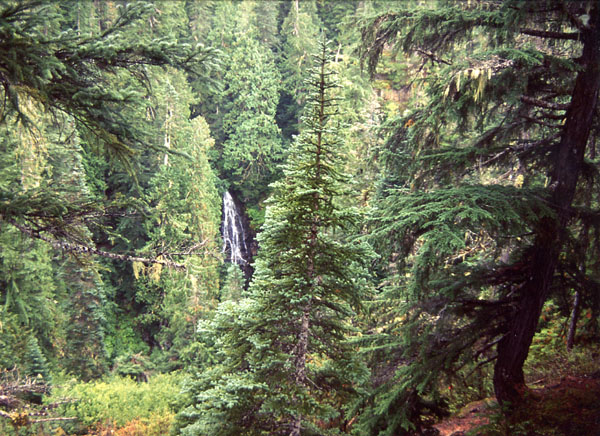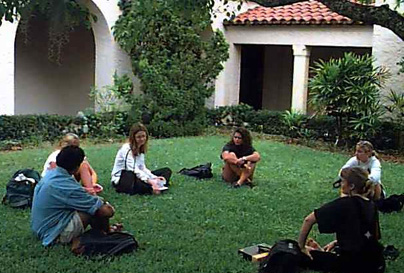
The Rhetoric of Leopold's Thinking Like A Mountain, (1948).
What possibly could animals have to do with the characteristics of this forest scene?
Analysis | Literal meaning | Figurative meaning | Changes in attitudes | lesson | analogies
Rhetorical means to reveal substantive meaning.
| ¶. paragraph | means | meaning |
|---|---|---|
| 1. | simile & emotion | an outburst of wild defiant sorrow, and contempt |
| 2. | flip & switch | there lies a deeper meaning.... the mountain has lived long enough to listen objectively. |
| 3. | revelation | the presence of wolves & the mountain's secret knowledge of them. |
| 4. | personalized | "the day I saw a wolf die...." |
| 5. | confession | never ... "passing up a chance to kill a wolf." |
| 6. | admission of fault | "in time to watch the fierce green fire dying in her eyes." |
| 7. | analogy | "watched the face of many a new wolfless mountain ...to anemic desuetude...death. |
| 8. | transposition | "a mountain lives in mortal fear of its deer." |
| 9. | extraction & transference | "Hence we have dustbowls, and rivers washing the future to the sea." |
| 10. | counterintuitive reinforcement | "...but too much safety seems to yield only danger in the long run." |
| Next |

Thinking Like A Mountain is a simile a part of speech that is an apparent comparing of two unlike things using like or as, because we do not associate thought with a mountain.
¶# 3. uncovering "the mountain's secret knowledge of them" –meaning "the presence of wolves."
Impact of Global Warming on biotic communities
the day I saw a wolf die,.... in time to watch the fierce green fire dying in her eyes.
" a range pulled down by too many deer may fail of replacement in as many decades." ¶ 8
VI
Leopold was a sportsman and hunter "with more excitement than than accuracy" who never hesitated.... " passing up a chance to kill a wolf."
"I was young then, and full of trigger itch; I believed that because fewer wolves meant more deer, that no wolves would mean a hunter's paradise." ¶ 4& 5
See paragraph 7 -- 9 "He has not learned to think like a mountain."
"Perhaps this is behind Thoreau's dictum: In wildness is the salvation of the world."
"long known among mountains but seldom perceived among men."
VI
"So does a mountain live in mortal fear..."
Paragraph 8, also 9 & 10. He links predators and prey to places and says that each is necessary to the survival of the other.
Complexity lies in the interconnectivity of what people perceive to be distinct cause and effect relationships among indecipherably interdependent landscape features, animals and their prey.
Food web of predator and prey relations is used to show how the habitat or range is protected by top level predators.
Sample student responses
September 2, 2003
RCC-100.19
Linking and Thinking about our place in nature
Erika - I remember the part when Leopold said, "In wildness is the salvation of the world."
Kevin - I remember Leopold stating that, " he never heard of passing up a chance to kill a wolf." Meaning that he killed a wolf and felt remorse while watching the wolf die.

1. Leopold was deer hunting and eating lunch that was the reason he was in wolf country. (Kevin )
2. He starts to view wolves as a necessary part of the food chain, because if they weren't there, the deer would be in abundance and they would eat all the plants off the mountain. Instead of seeing the wolf as a predator he realizes their need in nature. (Erika )
3. Yes, Leopold now has a change in his perception of the importance of wolves. He now views the wolves as the link to keeping the mountains alive. (Kevin )
4. Connections he made - Felt the pain of the wolf that he shot
Outline | Literal meaning | Figurative meaning | Changes in attitudes | lesson | Students' say